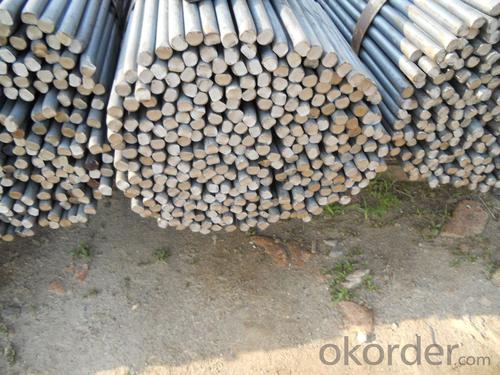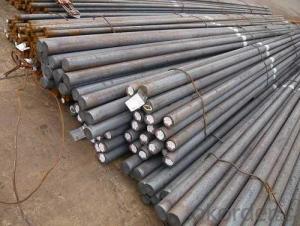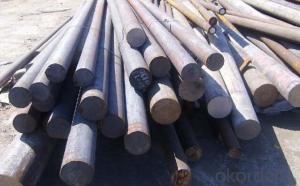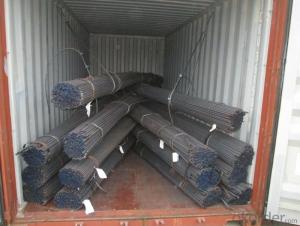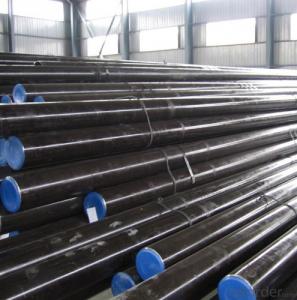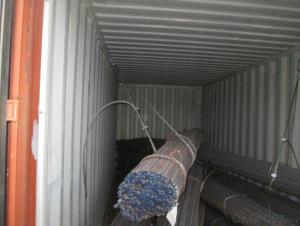Hot Rolled Round Steel Bar High Quality
- Loading Port:
- China Main Port
- Payment Terms:
- TT or LC
- Min Order Qty:
- -
- Supply Capability:
- -
OKorder Service Pledge
OKorder Financial Service
You Might Also Like
Product Description:
OKorder is offering Round Bar at great prices with worldwide shipping. Our supplier is a world-class manufacturer of steel, with our products utilized the world over. OKorder annually supplies products to European, North American and Asian markets. We provide quotations within 24 hours of receiving an inquiry and guarantee competitive prices.
Product Applications:
1. Hot rolled round bar of 6-25mm, or small round is mostly used for straight bundles supply, and used for steel, bolts and various mechanical parts. While the bigger round bar, or more than 25mm hot rolled bar, is mainly for the manufacture of mechanical parts or for seamless steel billet.
2. Besides, we can supply some especial material steel round bar that can be used for main shaft of steamer, hummer shank, with big section and supper force.
Product Advantages:
OKorder's Round Bar are durable, strong, and resist corrosion.
Main Product Features:
· Premium quality
· Prompt delivery & seaworthy packing (30 days after receiving deposit)
· Corrosion resistance
· Can be recycled and reused
· Mill test certification
· Professional Service
· Competitive pricing
Product Specifications:
1. Grade: Q195, Q235, Q345
2. Diameter: 6mm-150mm
3. Length: 6m, 9m, 12m or as customer’s request
4. Tolerance: Within ±5% for weight; ±2mm for diameter
5. Note: The price can be better is the quantity is good
6. Chemical composition
Alloy No | Element (%) | ||||
C | Mn | S | P | Si | |
Q195 | 0.06-0.12 | 0.25 | ≤0.05 | ≤0.045 | ≤0.3 |
Q235 | 0.12—0.20 | 0.3—0.7 | ≤0.045 | ≤0.045 | ≤0.3 |
Q345 | ≤0.2 | 1.00-1.60 | ≤0.045 | ≤0.045 | ≤0.55 |
Mechanical Properties | Grade | Steel diameter(mm) | |||
≤16 | 16~40 | 40~60 | 60~100 | ||
Yield Point Δs/MPa | Q195 | ≥195 | ≥185 | - | - |
Q235 | 235 | 225 | 215 | 205 | |
Tensile Strength | Q195 | 315~390 | |||
Q235 | 375~500 | ||||
Elongation δ5% | Q195 | ≥33 | ≥32 | - | - |
Q235 | 26 | 25 | 24 | 23 | |
Payment:
-Invoicing on theoretical weight or actual weight as customer’s request.
-FOB, CFR or CIF.
-Regular terms of payment:
1, 30% payment in advance, the remaining balance (70% payment) against the copy of B/L.
2, 30% payment in advance, the remaining balance (70% L/C) against the copy of B/L.
3, Negotiable.
-The payment terms will be written in contraction detailed.
FAQ:
Q1: Why buy Materials & Equipment from OKorder.com?
A1: All products offered byOKorder.com are carefully selected from China's most reliable manufacturing enterprises. Through its ISO certifications, OKorder.com adheres to the highest standards and a commitment to supply chain safety and customer satisfaction.
Q2: How do we guarantee the quality of our products?
A2: We have established an advanced quality management system which conducts strict quality tests at every step, from raw materials to the final product. At the same time, we provide extensive follow-up service assurances as required.
Q3: Can stainless steel rust?
A3: Stainless does not "rust" as you think of regular steel rusting with a red oxide on the surface that flakes off. If you see red rust it is probably due to some iron particles that have contaminated the surface of the stainless steel and it is these iron particles that are rusting. Look at the source of the rusting and see if you can remove it from the surface.
Images:
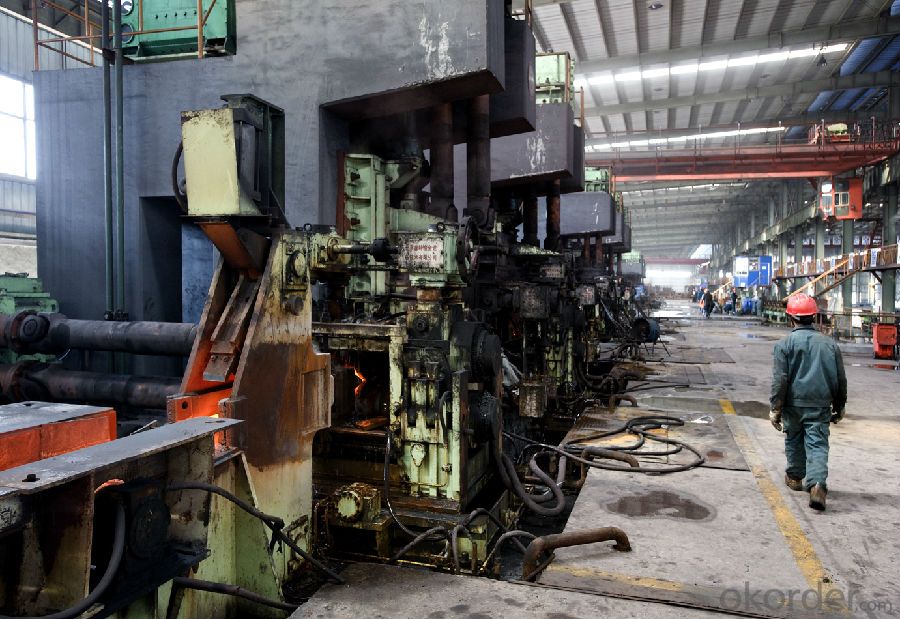
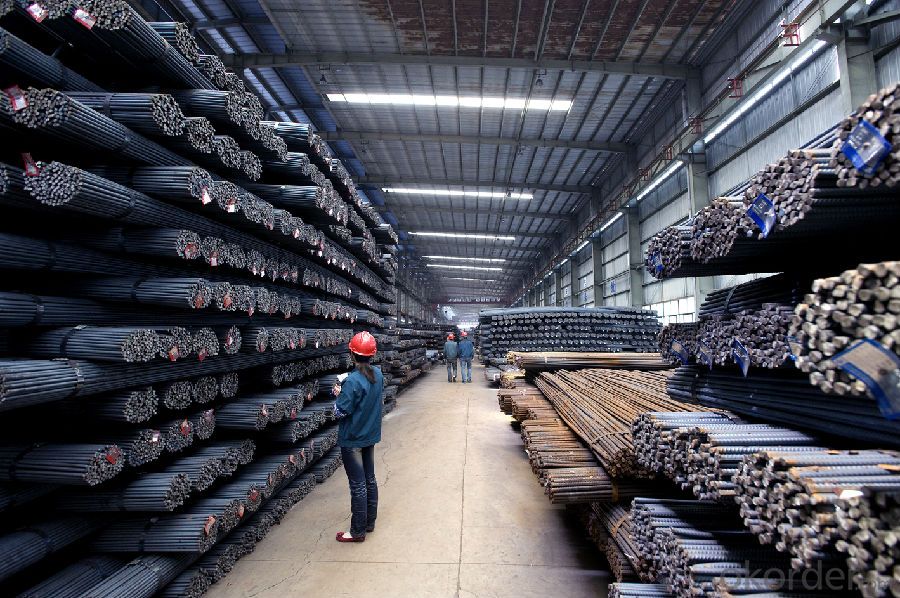
- Q: What are the different types of steel round bar coatings used in the oil and gas industry?
- In the oil and gas industry, several types of steel round bar coatings are commonly used to enhance the durability and corrosion resistance of the bars. These coatings are essential for protecting the steel from the harsh environments encountered in oil and gas production, transportation, and refining processes. 1. Galvanized Coating: Galvanization involves applying a layer of zinc to the steel round bar. This coating provides excellent corrosion resistance and protects the steel from the effects of moisture, chemicals, and exposure to the elements. Galvanized coatings are commonly used in various applications in the oil and gas industry, especially in pipelines, offshore platforms, and storage tanks. 2. Fusion Bonded Epoxy (FBE) Coating: FBE coating is a thermosetting epoxy powder coating applied to the steel round bar using electrostatic spray. The coating is then heat-fused to form a strong, durable, and corrosion-resistant layer. FBE coatings are widely used in the oil and gas industry for pipelines, valves, and fittings, as they provide excellent protection against corrosion, abrasion, and chemicals. 3. Polyethylene (PE) Coating: PE coating involves applying a layer of polyethylene to the steel round bar through extrusion or wrapping methods. This coating is commonly used for pipelines in the oil and gas industry as it provides exceptional resistance to corrosion, chemicals, and impact. PE coatings are also known for their flexibility, allowing the coated bars to withstand ground movement and temperature variations. 4. Polypropylene (PP) Coating: PP coating is similar to PE coating, but it uses polypropylene instead. PP coatings offer similar benefits to PE coatings, including corrosion resistance, chemical resistance, and flexibility. They are often used in the oil and gas industry for pipelines, particularly in areas with higher temperatures or where chemical resistance is a priority. 5. Zinc-Nickel Coating: Zinc-nickel coatings involve electroplating a layer of zinc-nickel alloy onto the steel round bar. This coating provides excellent corrosion protection, even in harsh environments such as offshore installations or high-salinity areas. Zinc-nickel coatings are known for their superior resistance to both corrosion and abrasion, making them ideal for various oil and gas applications. Overall, these different types of steel round bar coatings play a crucial role in safeguarding the integrity and longevity of equipment and infrastructure in the oil and gas industry. They ensure that the steel bars can withstand the demanding conditions encountered in exploration, production, and transportation, reducing maintenance needs and enhancing safety and reliability.
- Q: What is the maximum load capacity of a steel round bar?
- Various factors, including the diameter, length, and grade of the steel, influence the maximum load capacity of a steel round bar. Steel round bars are engineered to endure different levels of stress, resulting in varying load capacities. Generally, the yield strength and ultimate tensile strength of the steel determine the load capacity. To ascertain the maximum load capacity of a particular steel round bar, it is imperative to refer to engineering specifications or manufacturer-provided reference materials. These specifications will furnish the necessary data to compute the load capacity based on the precise dimensions and characteristics of the round bar. It is crucial to emphasize that load capacity calculations should be entrusted to qualified professionals who possess a comprehensive comprehension of structural engineering principles and material properties.
- Q: What is the difference between a seamless and a turned steel round bar?
- The manufacturing process and resulting characteristics distinguish a seamless steel round bar from a turned steel round bar. To produce a seamless steel round bar, a solid steel billet is pierced, typically through hot rolling. This creates a hollow tube-like structure that is then elongated and shaped into the desired round bar form. The absence of welded joints or seams along its length gives the seamless bar a smooth and continuous surface. This manufacturing method improves the overall strength and durability of the round bar. In contrast, a turned steel round bar begins as a solid steel bar obtained through casting or hot rolling. The bar undergoes a machining process called turning, where it is rotated against a cutting tool to remove material and achieve the desired dimensions and shape. This turning process results in a round bar with a smooth and polished surface. However, there may be mill marks or slight imperfections due to the machining process, unlike a seamless round bar. Seamless steel round bars are often preferred in industries that require high strength and reliability, such as construction, automotive, and oil and gas. Their uniform structure and absence of welds make them highly resistant to cracking and failure under heavy loads or extreme conditions. On the other hand, turned steel round bars are commonly used in applications where a smooth surface finish is desired, such as decorative pieces or precision components for machinery. In summary, the main difference between a seamless and a turned steel round bar lies in their manufacturing process and resulting characteristics. While both provide a smooth surface finish, seamless round bars offer enhanced strength and reliability due to their seamless structure, whereas turned round bars are often chosen for their precise dimensions and aesthetic qualities.
- Q: How do you calculate the maximum allowable stress for a steel round bar?
- To calculate the maximum allowable stress for a steel round bar, several factors need to be taken into consideration. The maximum allowable stress represents the maximum amount of stress that the material can withstand before it starts to deform or fail. 1. Determine the material properties: Steel round bars come in various grades, each with their own unique material properties. These properties include the ultimate tensile strength (UTS), yield strength, and elongation percentage. These values can typically be found in material specification documents or reference books. 2. Identify the design factor: The design factor, also known as the safety factor or factor of safety, is a multiplier applied to the maximum stress to ensure the structure or component is safe and can handle unexpected or dynamic loads. The design factor can vary depending on the application and industry standards. Common values are between 1.5 and 4. 3. Calculate the allowable stress: The allowable stress is calculated by dividing the yield strength of the material by the design factor. This ensures that the structure or component operates within a safe stress range. The formula can be expressed as: Allowable Stress = Yield Strength / Design Factor. For example, if a steel round bar has a yield strength of 300 MPa and a design factor of 2, the maximum allowable stress would be 150 MPa (300 MPa / 2). This means that the steel round bar can safely withstand a maximum stress of 150 MPa before the risk of deformation or failure. It is important to note that the maximum allowable stress is just one aspect of designing a structure or component. Other factors such as fatigue, environmental conditions, and load distribution should also be taken into account to ensure a safe and reliable design. Consulting relevant engineering codes, standards, and professional guidance is highly recommended when calculating the maximum allowable stress for a specific application.
- Q: What are the different methods used for machining steel round bars?
- There are several methods used for machining steel round bars, including turning, milling, drilling, and grinding. Turning involves rotating the bar against a cutting tool to create a desired shape. Milling utilizes rotary cutters to remove material from the bar's surface. Drilling involves creating holes in the bar using a drill bit. Grinding uses an abrasive wheel to smooth or shape the bar's surface. These methods may be used individually or in combination, depending on the desired outcome and the specific requirements of the project.
- Q: Are steel round bars available in different shapes other than round?
- No, steel round bars are specifically designed and manufactured in a cylindrical shape.
- Q: How are steel round bars classified based on their shape?
- Steel round bars are classified based on their shape into two main categories: hot-rolled round bars and cold-drawn round bars. Hot-rolled round bars are made by heating a steel billet until it becomes malleable and then passing it through a series of rollers to achieve the desired shape. This process results in a rougher surface texture and a slightly larger diameter compared to cold-drawn round bars. Hot-rolled round bars are commonly used in construction, engineering, and manufacturing applications where strength and durability are important. On the other hand, cold-drawn round bars are made by pulling a hot-rolled round bar through a series of dies at room temperature. This process improves the dimensional accuracy, surface finish, and mechanical properties of the steel. Cold-drawn round bars have a smoother surface texture and a more precise diameter, making them suitable for applications that require tight tolerances, such as precision machining, automotive components, and shafts for machinery. In summary, the classification of steel round bars based on their shape is determined by the manufacturing process used. Hot-rolled round bars are rougher and slightly larger in diameter, while cold-drawn round bars have a smoother surface texture and more precise dimensions. The choice between these two categories depends on the specific requirements of the application.
- Q: Can steel round bars be used in marine environments?
- Steel round bars can indeed be utilized in marine settings. Nonetheless, it is crucial to select the appropriate steel variant that is specifically engineered for marine purposes. Among the various options, stainless steel stands out as the most frequently utilized due to its ability to resist corrosion. This is primarily due to its high chromium content, which facilitates the formation of a protective oxide layer on the steel's surface, thereby safeguarding it against corrosion caused by saltwater and other harsh elements. Moreover, stainless steel round bars are renowned for their robustness and durability, making them well-suited for an array of marine applications such as ship construction, offshore structures, and marine equipment. To ensure the enduring performance of steel round bars in marine environments, regular maintenance and proper care are imperative.
- Q: How do I determine the strength and hardness of a steel round bar?
- To determine the strength and hardness of a steel round bar, there are a few techniques and tests that can be used: 1. Tensile Test: This is the most common method for determining the strength of a steel bar. It involves applying a tensile force to the bar until it breaks, and measuring the maximum force or load it can withstand. This test provides information about the bar's ultimate tensile strength, yield strength, and elongation. 2. Hardness Test: There are several methods to measure the hardness of a steel bar, including the Rockwell, Brinell, and Vickers hardness tests. These tests involve indenting the surface of the bar with a standardized indenter and measuring the resulting indentation size. The hardness value obtained provides an indication of the bar's resistance to deformation and wear. 3. Charpy Impact Test: This test measures the toughness of a steel bar by striking it with a swinging pendulum and measuring the energy absorbed during fracture. It helps determine the ability of the bar to resist brittle fracture under impact loading conditions. 4. Microstructural Analysis: A microscopic examination of the steel bar's microstructure can provide insights into its mechanical properties. By preparing a polished and etched sample and examining it under a microscope, the presence of different phases, grain size, and any structural abnormalities can be observed. Different microstructural features can influence the strength and hardness of the bar. 5. Chemical Composition Analysis: The chemical composition of the steel bar, particularly the carbon content, plays a significant role in determining its strength and hardness. Analyzing the composition using techniques like spectroscopy or chemical analysis can provide valuable information about the bar's mechanical properties. It is important to note that these tests and techniques should be conducted by qualified professionals in a controlled laboratory environment to ensure accurate and reliable results. Additionally, specific standards and specifications may exist for different applications, so consulting relevant standards and guidelines can provide further guidance on determining the strength and hardness of a steel round bar.
- Q: Can steel round bars be used for making crankshafts?
- Yes, steel round bars can be used for making crankshafts. Crankshafts are important components in engines that convert the reciprocating motion of the pistons into rotational motion. Steel is a preferred material for crankshafts due to its high strength, durability, and ability to withstand the stress and load generated during engine operation. Steel round bars are often used for making crankshafts as they provide a solid and reliable foundation for the rotating assembly. The round shape of the bars allows for easy machining and shaping into the desired crankshaft design. Additionally, steel can be heat-treated to further enhance its mechanical properties, such as hardness and fatigue resistance, making it ideal for the demanding conditions and high-performance requirements of crankshafts in various engine applications.
Send your message to us
Hot Rolled Round Steel Bar High Quality
- Loading Port:
- China Main Port
- Payment Terms:
- TT or LC
- Min Order Qty:
- -
- Supply Capability:
- -
OKorder Service Pledge
OKorder Financial Service
Similar products
Hot products
Hot Searches
Related keywords



